In episode 181 of the Disruptors for GOOD podcast, we speak with Ben Mand, CEO of Harmless Harvest, on regenerative farming, ethical supply chains, and the future of plastic bottles.
Listen to more Causeartist podcasts.
Ben Mand is an accomplished executive with extensive domestic and international experience in strategic planning, P&L oversight, global supply chain and operations, multichannel product delivery, new business creation, and marketing communications, particularly in start-up and growth organizations.
Mand is currently the CEO of Harmless Harvest, a leader in premium coconut water and plant-based dairy, and the only Fair For Life Certified Organic Producer.
As CEO, he provides executive leadership of the plant-based food and beverage company with over $100 million in revenue, with full responsibility for global sales and operations and over 700 employees.
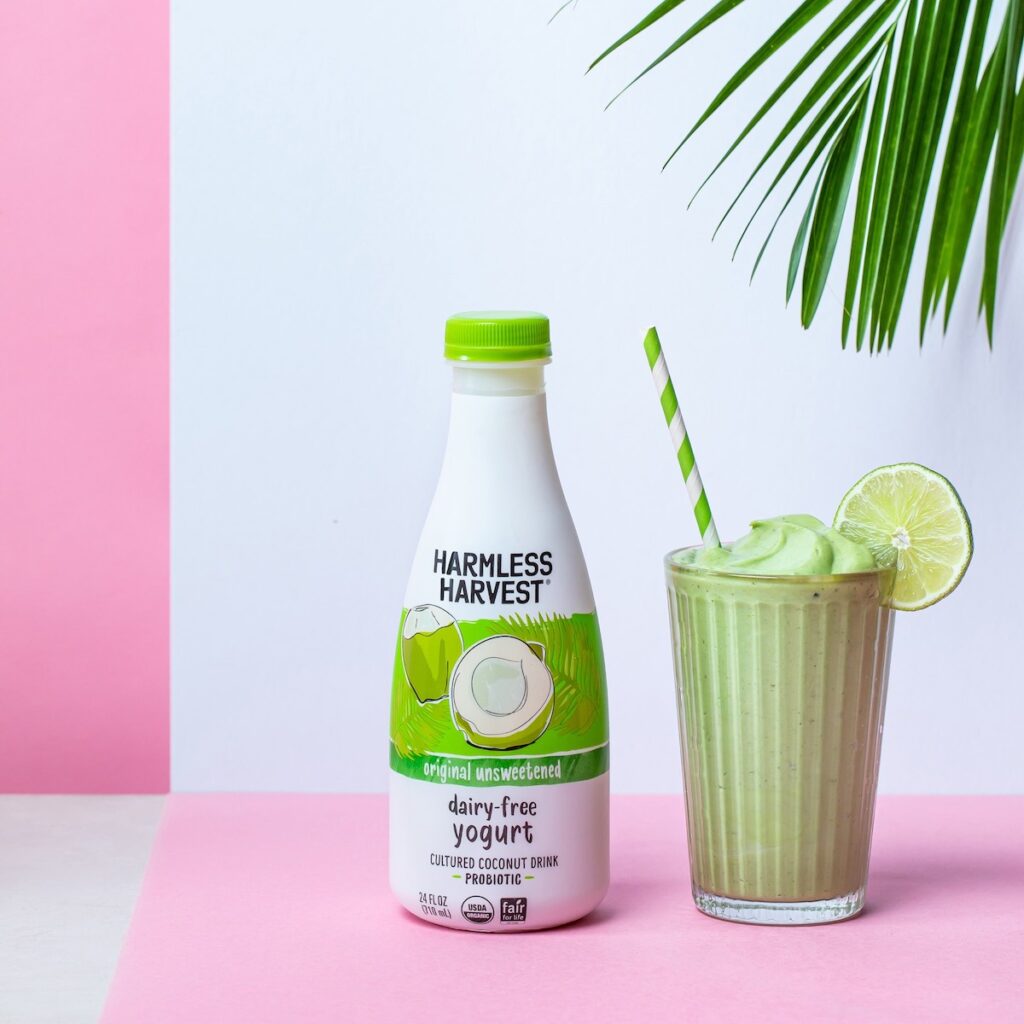
Prior to his role at Harmless Harvest, Mand was responsible for the business P&L, Strat Plan, marketing communications, innovation, mission, and creative at Plum Organics.
During his time there, he was instrumental in strengthening Plum’s core mission, developing an award-winning brand campaign and activation, and launching more than 50 new products, which helped accelerate the brand from the #3 to the #1 organic baby food company.
Before joining Plum, Mand held various brand marketing and innovation roles at leading companies, including General Mills, Johnson & Johnson, and Interbrand.
He made an impact as a change agent, driving improvements in health, sustainability, and social impact while delivering consistent sales and profit growth for well-known brands such as Progresso, Pillsbury, Yoplait, Topamax, LexisNexis, Canal+, and Symantec.
About Harmless Harvest
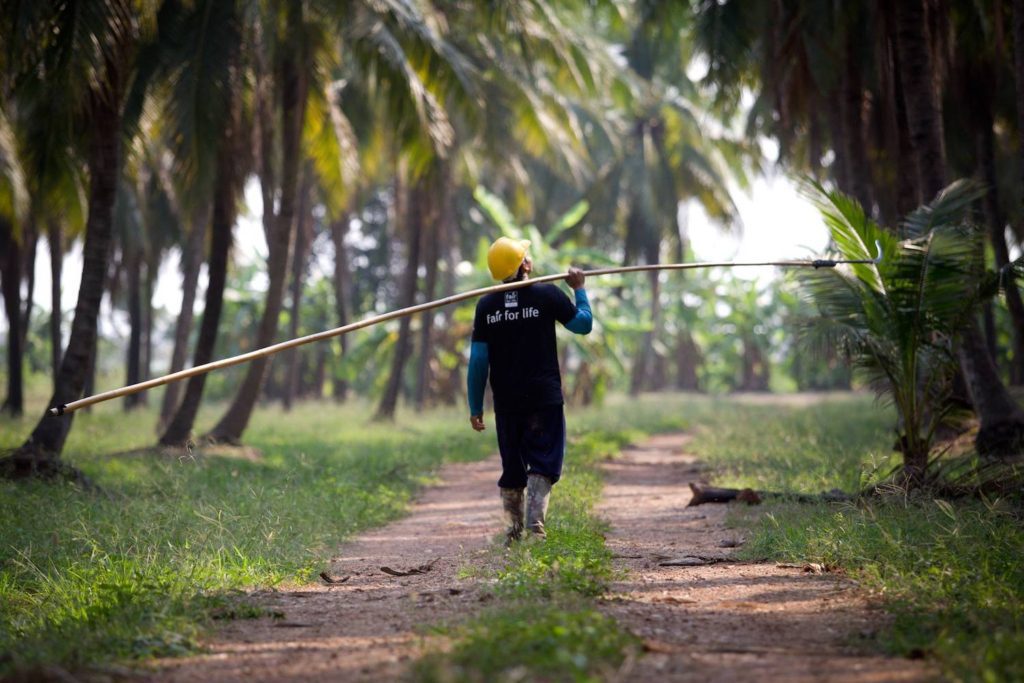
Harmless Harvest is a company that is on a mission to provide the best-tasting and most nutritious coconut water in the most ethical way possible. Their commitment to ethical and sustainable practices is evident in everything they do, from the way they source their coconuts to the way they treat their employees.
At the heart of Harmless Harvest’s mission is a commitment to transparency and fairness. The company is dedicated to working with farmers who use sustainable and regenerative farming practices, which helps to protect the environment and ensures that the farmers are paid fairly for their work.
In addition, Harmless Harvest is the only coconut water producer to be certified Fair For Life, a certification that recognizes ethical and fair labor practices throughout the supply chain.
Harmless Harvest’s commitment to sustainability and ethical business practices doesn’t stop with its farming partnerships.
The company is also dedicated to minimizing its environmental impact by using 100% post-consumer recycled plastic for its bottles and investing in renewable energy projects to offset its carbon emissions.
All of this commitment to ethical and sustainable practices might make you wonder, “But what about the product itself?” Fear not, because Harmless Harvest’s coconut water is also delicious and nutritious.
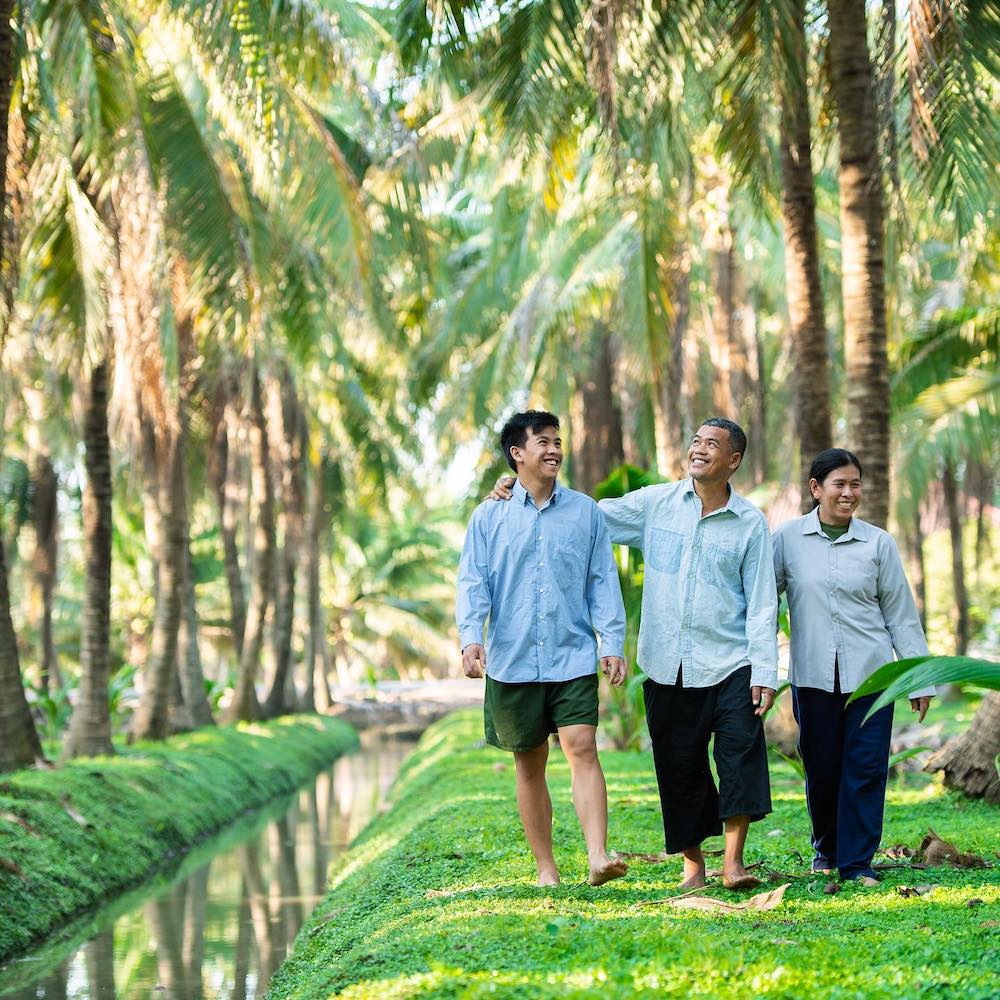
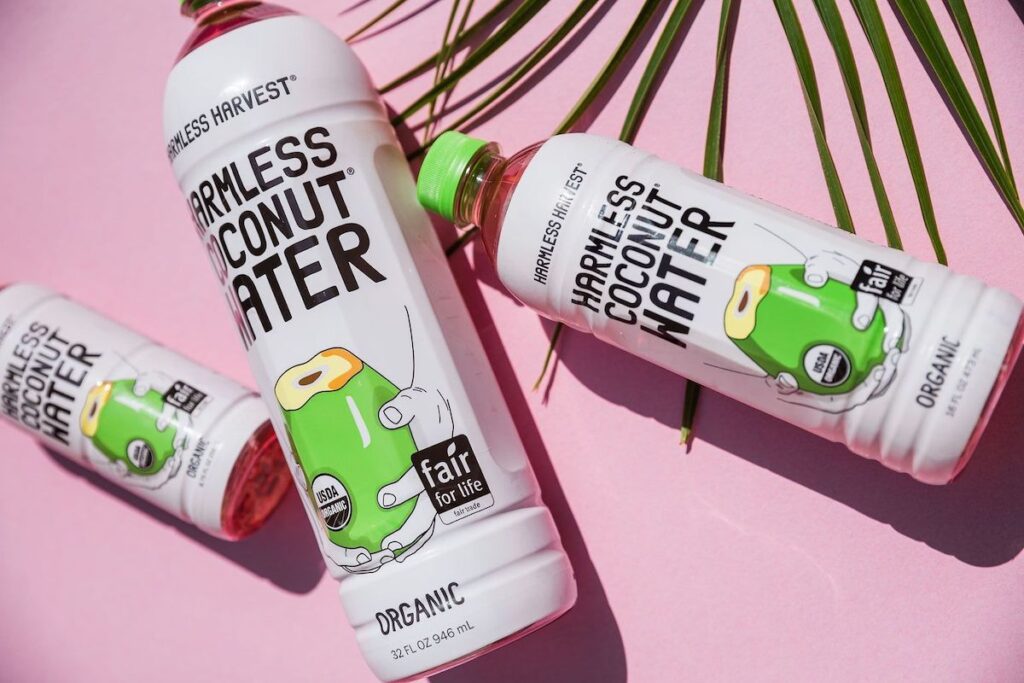
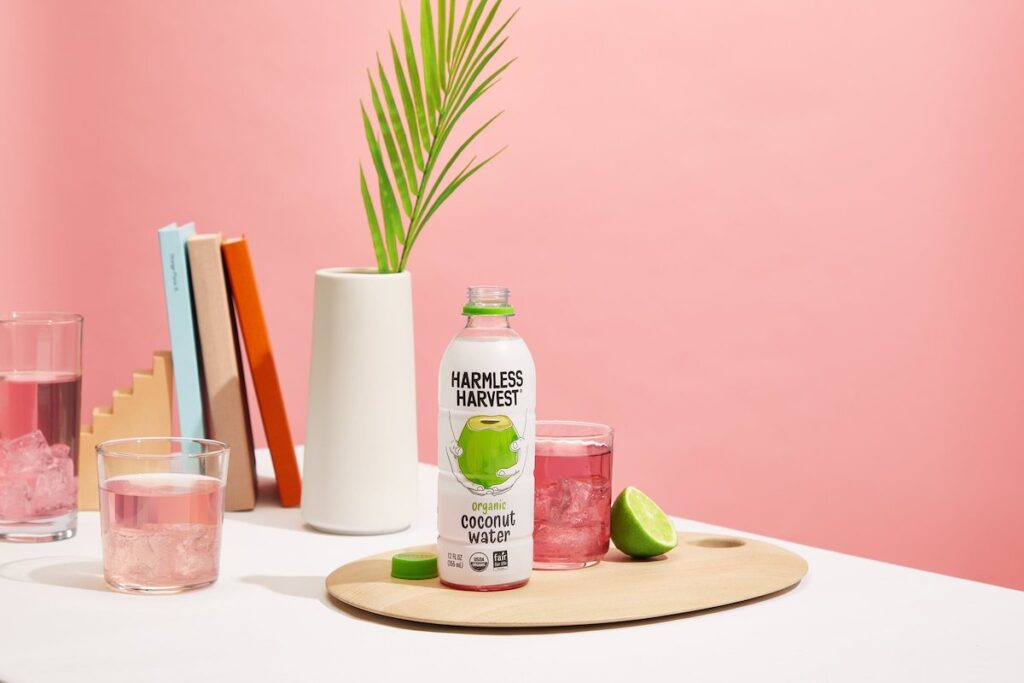
The company uses a unique, micro-filtration process to maintain the flavor and nutritional value of the coconut water while ensuring that it’s free from harmful bacteria. The result is a pure, refreshing beverage that’s perfect for hydrating after a workout or as a refreshing beverage on a hot day.
In addition to its original coconut water, Harmless Harvest also offers a variety of other coconut-based products, including plant-based yogurts.
All of these products are made with the same commitment to sustainability, fairness, and transparency that has made Harmless Harvest such a beloved brand.
Overall, Harmless Harvest is a company that is truly committed to making a positive impact on the world.
From its partnerships with sustainable farmers to its focus on supporting social and environmental initiatives, Harmless Harvest is proof that businesses can be successful while still prioritizing ethical and sustainable practices.
Interview Transcript
00:09
Host: Well, thank you so much, Ben, for joining me today. Very excited to talk about your incredible journey in your career so far and what you’re building now at Harmless Harvest, and the mission and vision of what you’re doing with that brand. Before we get into all that, talk a little bit about your journey and career path before Harmless Harvest.
00:37
Ben: Thanks for having me. My story started in rural Wisconsin. I’m a first-generation college student and didn’t even know I wanted to go to college at a young age. I had chores to do, lived on an old farm, and we’d take our garbage to the dump every Saturday, looking for treasures. My first bike came from the dump. This upbringing gave me an eternal optimism and an incredible work ethic. I’m comfortable in any environment, whether composting or in a board meeting. My first real paying job was as a busboy at a private Golf and Country Club in Fond du Lac, Wisconsin. That’s when I realized I didn’t want to work in a factory; I wanted to go to college. I attended the University of Wisconsin-Madison, which was an amazing experience.
01:40
My career started in management consulting on the East Coast. I took a leave of absence to do volunteer work in Central America with my girlfriend, now my wife. We worked on an organic coffee farm in Costa Rica, lived with families to learn Spanish, and did more volunteer work in Guatemala, including composting and building homes. This experience solidified my desire to give back to communities. After returning, I worked in brand strategy consulting, which made me realize I could aspire to be a CEO someday. I went back for my MBA at Kellogg, and my wife did AmeriCorps VISTA in Chicago. We moved to the East Coast, where she went to Wharton, and I worked at Johnson & Johnson on a global launch. Later, we both worked at General Mills for about eight years, where I learned how to run a business.
05:00
At General Mills, I focused on improving products by eliminating things like high levels of sodium, artificial flavors, and colors. My next role was at Plum Organics, where I could bring my full self to work, expanding an inherently nutritious organic B Corp to more households. This role was all about growing top line, achieving profitability, and positively impacting communities and the environment.
06:40
When it came to Harmless Harvest, three things struck me: it’s a responsible business, I love the product, and I believed my skills and the talent I could build around me would unlock its potential. Harmless Harvest’s unique coconut and proprietary process result in a fresh-tasting coconut water. Despite its struggles, I saw the potential to turn things around.
10:22
Host: Speaking about General Mills and Plum Organics, it seems like you’re trying to create a hybrid of those two identities. Harmless Harvest has a global reach and a focus on health and wellness. How do you explain Harmless Harvest to someone who thinks it’s just coconut water?
11:52
Ben: Great question. First, we encourage people to recycle, not throw away the bottle. Harmless Harvest is committed to a 50% reduction in greenhouse gas emissions by 2025. We’re transparent about our progress. We’ve already moved to 100% recycled plastic for our beverages and aim to be 50% regenerative organic by the end of this year. We work directly with farmers on regenerative organic practices. Our unique approach involves training farmers, including those not supplying to us, on sustainable practices. Our agronomists work on the ground to ensure compliance and improve farming methods.
15:22
One surprising finding was that two-thirds of our emissions come from foliage decomposing in canals and not using the full coconut, which emits methane. We’re addressing this by incorporating foliage into our composting activities. We also aim to use the entire coconut, including the husk, for various products. We’ve developed products like yogurt and smoothies from coconut meat, and are exploring uses for the husk, such as biochar.
19:03
Host: You work with many farms. How do you handle farms that don’t meet your standards for regenerative practices?
22:07
Ben: We have a team that enforces compliance through audits. We work with farmers to transition to regenerative practices, aiming to raise their incomes by at least 10%. We subsidize the transition by providing compost, training, and other resources. It’s an investment, but we’ve seen positive impacts already. Even non-supplying farmers benefit from our training programs. Our approach includes working with government bodies to ensure support for our farmers.
28:00
Host: We talked about single-use plastics and the challenges of making them sustainable. What’s your take on where we are with single-use plastics and what steps are being taken?
29:12
Ben: Plastic has the lowest climate impact compared to other materials. We transitioned to 100% recycled plastic to create an economic incentive for recycling. Plant-based plastics are promising but currently pose challenges in the recycling stream. We continue to explore innovative packaging solutions, like using coconut husk for corrugate. Standardizing recycling practices nationwide and providing incentives for both consumers and municipalities are crucial steps.
37:18
Host: Incentives are key. How do we incentivize consumers and municipalities to recycle more?
38:49
Ben: Standardizing recycling is essential. Providing incentives, like paying for recycled plastic, can encourage both consumers and municipalities. Government support in the form of subsidies and tax breaks can help build the necessary infrastructure for recycling.
41:34
Host: Looking to the future, what does success look like for Harmless Harvest in the next three to five years?
41:34
Ben: Success means having a profitable business that grows sales and serves communities and the environment responsibly. We aim to be climate positive, using the entire coconut, and ensuring our farms are biodiverse and regenerative. We want our products to reach more households while maintaining economic viability. Expanding our product range and continuing to improve our sustainability practices are key goals.
45:23
Host: Amazing, Ben. Thank you for taking the time to share your insights and vision. Best of luck to you and your team for the future.
Ben: Thanks so much, Grant.








